Do People Trust Apps That Track Their Location?

Do People Trust Apps That Track Their Location?
Not all app users are comfortable with apps that track and collect location data, which presents challenges for businesses. Location tracking technology is a popular app feature, and location data provides a more personal experience for users--many of who want to know information about their surroundings, such as where the nearest coffee shop is, or their friends' whereabouts.
Today, more than 2.5 billion people own a smartphone with the average person using 9 apps per day.
Location data is valuable for companies that use apps to advertise and acquire new customers. Social, transportation, health, and dating apps all offer customized services based on where users go and live.
Apps that map users’ locations offer socioeconomic insights and buyer persona demographics that provide distinct targeting and selling opportunities.
Many people recognize the potential benefits of location tracking features, which offer a more unique and useful experience. Still, not everyone is comfortable with or aware of how much information apps can acquire. A recent New York Times article highlighted how one woman’s smartphone exposed her health, work, and relationship choices as it charted her daily life.
As apps use location tracking to collect huge amounts of data, the potential for gaining insight into users’ lives is enormous. Still, companies must evaluate the potential security risks of location tracking before assuming responsibility for such a large database of information.
Use this article to evaluate whether your app should use location tracking features to improve customer satisfaction and how you can protect your users from potential privacy violations.
Our Findings
- More than one-third of people (37%) enable location tracking on 6-11 apps, virtually all of the average of 9 apps people use daily.
- Almost all smartphone users (81%) know how to adjust their phone’s location settings but may not realize their attempts to block location tracking are actually ineffective.
- Most users feel safe when using apps that track their locations. More than half of people (57%) are comfortable with apps that track their location compared to only 15% of smartphone users who do not want apps knowing their whereabouts.
- Nearly half of people (42%) find location tracking apps convenient, while an additional 29% of people feel safer when apps know their location.
- More than double the number of men (35%) are willing to share their location with dating apps compared to women (16%), who are less sure of whether location tracking is safe.
- Among people who feel uncomfortable using location tracking apps, most (52%) say it’s because they feel unsafe.
- Almost one-third of people (31%) want complete privacy and don’t trust companies with their information.
People Think They Can Turn Off Location Tracking, But It's Not So Simple
Today, location tracking is a standard feature for companies that want to personalize users’ experiences with an app or acquire user information for marketing.
Location tracking apps use GPS technology, which pings the smartphone’s signal off satellites, cell towers, or public Wi-Fi networks. These signals chart where people are located, making it easy to offer location-specific services, such as maps of nearby restaurants or services.
More than three-quarters of users (81%) say they know how to turn off location data in settings.
![]()
Recently, however, app users discovered that Google and Apple can still track where they go – regardless of whether they disable location tracking for certain apps.
Google, especially, appears to share location data across its products, even when users do not want to share their location information. Android apps share at least 90% of their data with Google, allowing Google to access an enormous amount of behavioral information.
Google possesses the largest database, with more than 105 million active users and access to YouTube’s 1 billion unique monthly visitors.
In 2018, users discovered that Google records people’s location even when they specifically stop the feature. Although Google says people can “pause” their “Location History,” Google automatically stores the data anyway.
Google uses this information to create targeted ad experiences and sells the information to other companies.
The only way to comprehensively stop location tracking on Android devices is to manually and individually delete location markers that are already stored in the phone. Below, Google maps user activity, directly showing where users went at specific times of the day.
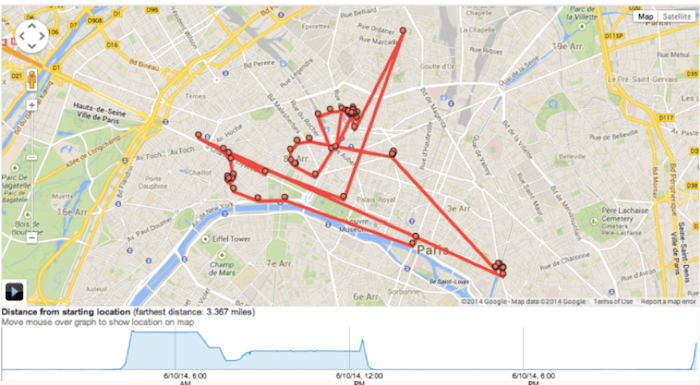
People can easily access this information by going into the “Location History” and “Timeline” section of their Google account.
Apple also uses location tracking features, specifically one called “significant locations” that captures “significant” places users go and recommends restaurants and events based on this information.
Apple only stores the most recent few months in its database, deleting old information it does not deem useful anymore.
Both Apple and Google make it difficult to turn off location data. Apple, however, does actually stop tracking location once the “Significant Location” feature is switched off on the phone.
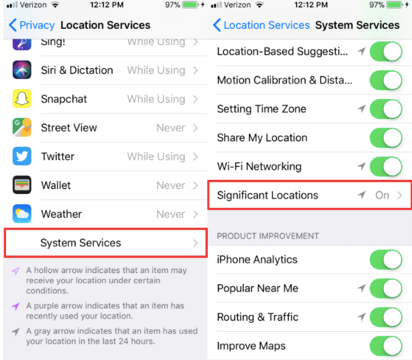
Google, however, allows certain apps to monitor location in the background even when the Android location tracking settings are switched off. If users want to completely disable location tracking they must turn off Location History and Web & App Activity, which are already on by default. Most users aren’t even aware that the option to turn these off exists.
While Apple focuses more on selling physical products, Google makes billions of dollars from advertising, which means it is highly motivated to continue tracking users’ locations.
Most People Are Comfortable With Location Features in Their Apps
Location tracking apps offer a streamlined and personalized experience that most smartphone owners appreciate.
More than one-third of users (37%) are aware that an average of 6 to 11 apps constantly track their location. Considering the average person uses 9 apps a day, location tracking features seem to be in almost every app available.
The majority of people (57%) are comfortable with apps tracking their location.
![]()
Nearly one-third of smartphone owners (28%) don’t think about location tracking at all, and only 15% of people feel uncomfortable with how apps can follow their location.
People feel comfortable with location tracking apps because they appreciate the value location tracking adds to their experience. For many, location data’s potential benefits outweigh the risks.
Retail apps, for example, can use location tracking technology to create more customized services for their customers.
“There’s particularly a good use for location tracking in retail and e-commerce sites,” said Adam Fingerman, founder of ArcTouch, a mobile app design and development company in San Francisco. “They can use store locators and location tracking to serve a contextualized experience based on your proximity to a physical store.”
Location tracking is key to retail’s future because it offers an omnichannel experience. If a user lives close to the store, an app will recommend they visit the physical location.
Meanwhile, if the user lives far away, the app will know to recommend an online purchasing experience. The app can cater to the buying journey depending on users’ locations.
People are willing to trade their location data for the efficiencies and personalized services location tracking provides.
Why Do People Allow Apps to Access Location Data?
People are willing to trade their privacy if they believe the app’s benefits are greater than its potential risk.
The two most common reasons people use location tracking apps are:
- Convenience
- Safety
Location Tracking Technology Is Convenient
Location tracking technology enhances user experience by providing relevant and personalized search results.
Almost half of people (42%) value the convenience location tracking apps provide.

These users believe location technology makes their lives easier by simplifying decisions. Location features filter relevant search results, prioritizing results that are closest to the smartphone owner.
Location data also allows devices to store information like frequently used addresses and favorite stores, rewarding app use with a more personalized experience.
Many apps center their entire function around location tracking. There are 3 main ways location services provide convenience:
- Discovering nearby businesses, communities, or events
- Delivering location-specific services and ads
- Facilitating communication between users
Considering these conveniences, people feel it’s worthwhile to share their location information.
1. Location Tracking Helps Users Discover Nearby Businesses, Communities, and Events
Location tracking apps allow users to explore nearby areas without having to physically go to them.
Foursquare, the popular search-and-discovery app, connects users with restaurants, events, and communities around them.
Foursquare discovered people wanted to find local events when they traveled but didn’t know how. Today, the app provides recommendations depending on users’ search and purchase history.
For example, if a user frequents burger restaurants, Foursquare would recommend the top-rated burger restaurants in the area.
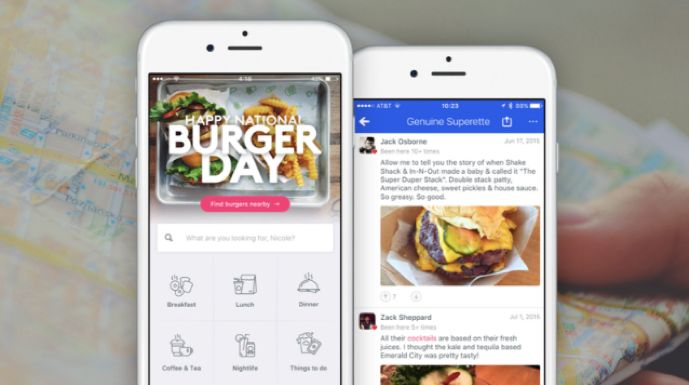
Foursquare shows previous reviews and comments from people who have “checked-in” at these restaurants, meaning the data is fresh and relevant. Users can then choose the restaurant with the feedback that bests fits their needs and go to it.
Apps can provide services based on the user’s current location, learning to make personalized experiences based on past behavior and current physical proximity.
2. Location Tracking Delivers Tailored Services and Ads
Location tracking apps offer targeted ads and services to customers who frequently use their platforms.
Location tracking technology in apps like Foursquare, Pokémon Go, and Uber use location as their primary method of service. These apps are oriented according to where people are and how to connect people with places.
Foursquare has specific places people can “check-in” to connect with other people in the area who have used a suggested service.
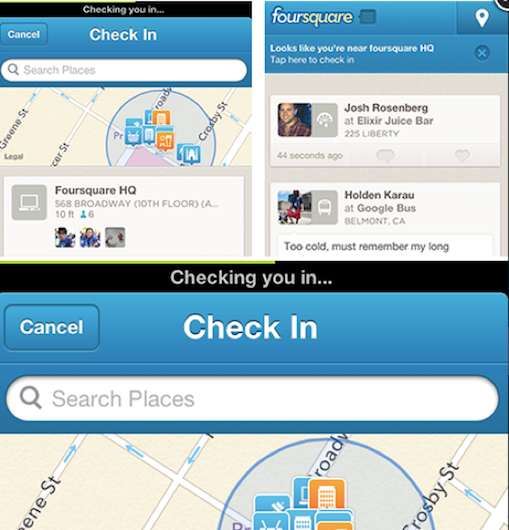
Although Foursquare originally began as a social network, the app is now a data collection platform for enterprises with more than 3 billion visits per month. Users around the world engage with 105 million global check-in locations.
Advertisers find the information that Foursquare collects to be extremely valuable for creating targeted advertisements.
Location tracking apps allow advertisers to relate buying experiences in real-time.
3. Apps Use Location to Facilitate Communication Between Users
People use location-based apps to check in with their friends or significant other, saving time and providing reassurance.
Robert Siciliano is the founder of Safr.me, a consulting company about preventing identity theft.
“My wife and I use location tracking apps multiple times a day,” Siciliano said. “As parents and in business together, we need to check in for help with various responsibilities.”
Using a location tracking app, Siciliano can simply check his wife’s location instead of texting “Where are you?” several times a day. This streamlined communication is efficient, improves safety by eliminating texting while driving, and prevents people from interrupting each other unnecessarily.
Apps like Find My Friends provide easy access to friends’ locations.
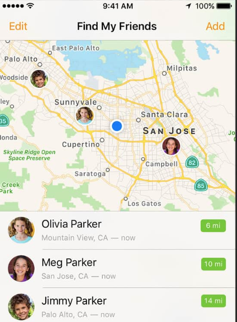
Find My Friends provides a map that pinpoints exactly where friends are in real-time. People, however, must individually grant other users access to their location.
Overall, location tracking can facilitate more efficient and accurate communication.
Location Tracking Makes Some People Feel Safer
Location tracking gives some people a feeling of security, especially when they use apps to ensure someone is aware of their whereabouts.
More than one-quarter of people (29%) believe location tracking technology improves their safety.
![]()
People enjoy using location tracking apps that show where their friends and families are, especially when they travel to unfamiliar areas or walk around late at night.
“I love location-tracking apps, particularly those that use geo-fences,” said Eric Sims, owner of Robot Cleaner Store, an online retail store for robotic cleaning supplies. “I used to have to walk through a somewhat unsavory area of town to get from the train to my office, and my wife worried about me. I started using an app that would send her a text each day when I made it to work safely.”
Sims’ experience demonstrates how location apps provide a feeling of safety that stopped his wife’s worries. The app’s geolocating features improved their daily experience of his commute.
Apps like HERE notify friends and family when you arrive at your destination. The app sends an automatic text that puts people’s minds at ease:
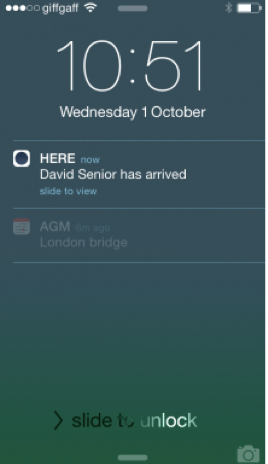
Parents also recognize the benefits of location tracking apps. They can now know where their kids are at all times.
“As the parent of a teen, I find location tracking apps invaluable,” said Maimah Karmo, founder of the Tigerlily Foundation, a breast cancer awareness organization. “It helps me to track her for safety purposes and make sure that she is okay.”
Although only 16% of parents track their teen's location, many kids share their location with parents for short periods of time, such as when they travel alone or walk through an unknown area at night. These safety benefits provide peace of mind.
People also use apps to track elderly relatives’ locations. Location tracking allows families to keep tabs on where their elderly relatives are and if they haven’t moved in a while, which could indicate a dangerous fall. Location-based apps can help keep elderly relatives healthy and prevent further harm.
“My grandmother lives alone and was not answering her cell phone or her house phone,” said Justin Sochovka, a television personality and electronics expert. “We were worried about what was going on because it began to snow, and she doesn't typically like to leave her house in bad weather. I tracked her, saw she was at Walmart, and watched to make sure she got back home.”
Sochovka was able to verify that his grandmother was safe and not hurt in the storm. The location app reassured him of her well-being.
Location apps provide reassurance and safety by alerting friends if a person’s activity is anomalous.
Location Tracking Raises Privacy Concerns
Although many people value the advantages of location tracking apps, some people fear these apps undermine consumer privacy.
Among people who are not comfortable with location tracking apps, 15% cite lack of privacy as their top concern.
Almost one-third of these users (31%) want complete privacy, and 52% don’t feel safe using location tracking apps.

These users worry that hackers could gain access to people’s exact locations. Kids, especially, could be at risk if someone accessed their daily routes.
In practice, location data is as secure as the app that collects it.
“It depends on how you’re coding the application,” said Sudeep Srivastava, CEO of Appinventiv, a mobile app development company. “If you’re tracking the live location of the user and you’re not storing it securely, then it can be hacked.”
Location tracking does not present a larger security risk than other data. The complexity of securing the location technology in an app is the same as securing the rest of the app. There are no added vulnerabilities once implemented.
Breaching location data, however, has more serious consequences than other security failures. For example, if a hacker can access maps of a user’s routine, they could know people’s locations at exact times and target victims with robberies or other crimes.
App developers should make sure their app has the proper security requirements in place when using location tracking features.
Men Feel Safer Than Women When Using Location Tracking Apps
Men tend to be more comfortable with sharing their location compared to women.
More than one-third of men (35%) feel safe sharing their location on dating apps, while only 16% of women are comfortable sharing their location.
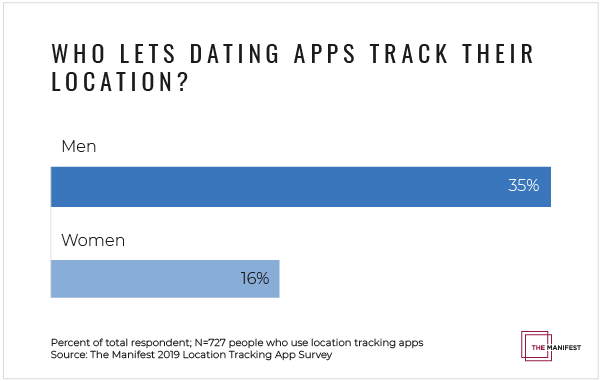
Considering 1 in 5 women are assaulted in their lifetime, women tend to be more cautious of strangers, on average, than men.
In 2018, Tinder released a new feature on its dating app platform called Places. This feature pinpoints exactly where potential matches are and aligns a user with possible connections depending on which places the user frequents.
Tinder asks users if they want locations to be remembered or deleted from the “connection map.”
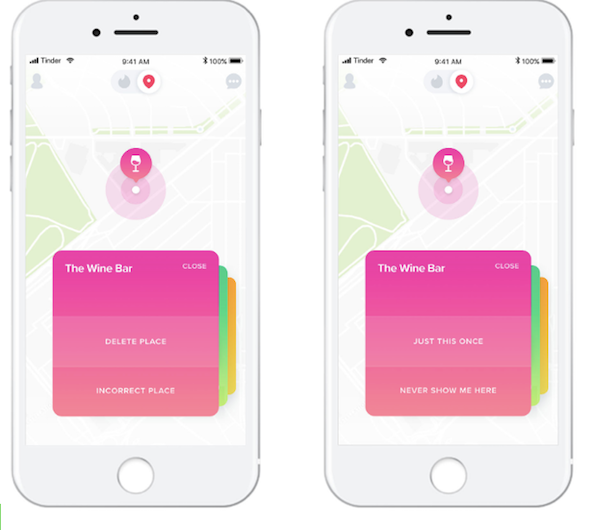
Tinder only shares location in designated “social places” and waits for 30 minutes before associating the user with the location. These precautions help prevent stalking and obscure users’ routines.
Samantha Stevens, director of Tinder’s Location Products, said, “As a female who designed this feature, I personally made sure that I would feel safe using it.”
By comparison, men are less worried about meeting strangers and are more likely to feel safe sharing their location with not only an app but also all their contacts.
Surprisingly, one in five men (20%) feel comfortable sharing their location with everyone on their phone, more than double the percentage of women (9%).
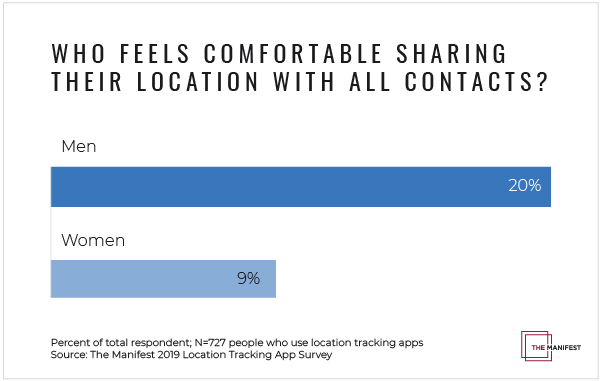
In 2017, Snapchat released the “map” feature, which allows users to share their location on a digital map.
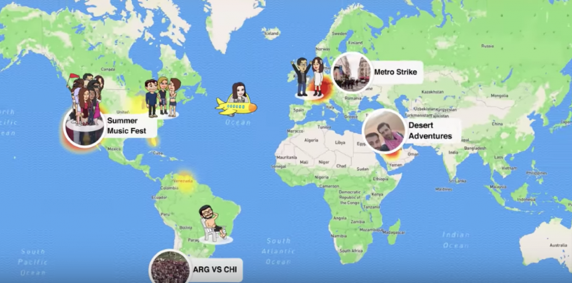
Many people expressed concerns, especially that they did not personally know all their “friends” on Snapchat and felt unsafe revealing their location.
Parents, especially, worried that their kids would friend a predator who could easily track their location over Snapchat.
In response, Snapchat updated its settings, allowing users to choose who can access their location, rather than making it automatically visible to all contacts.
App developers can learn from Tinder and Snapchat. When using location tracking features, companies must recognize people’s safety concerns and design location policies that are both transparent and secure against predators.
By anticipating privacy concerns, companies can build safer apps.
Location Tracking Features Will Be The Standard
Location tracking is a standard app functionality. Many app developers value the enhanced customer experience or want to use location data to sell user information to ad agencies.
Although some people are uncomfortable about the privacy risks of location tracking apps, most consumers believe the benefits outweigh potential costs.
Among smartphone owners who are comfortable with location tracking, the majority appreciate that it improves convenience and safety. Location tracking can provide better service for users who want immediate access to information about their surroundings or a history of their favorite places.
People also feel better knowing someone else is aware of where they are and that they can use location-based apps to call for help if needed.
Still, some users do not like companies having such comprehensive information about their daily activities. They fear possible hacking attacks and personal safety risks. Women tend to have more concerns about their personal safety than men.
Companies should be aware of the risks of insecure location data. Make sure your business creates secure firewalls and implements preventive measures against malware. Hire an experienced mobile app developer to safely build your app with location tracking features.
Location tracking can provide impressive and insightful service to consumers – as long as it is protected correctly.
About the Survey
The Manifest surveyed 727 people across the U.S. who use location-tracking apps.
More than half the survey respondents are female (54%), and 46% are male.
About 17% of respondents are between ages 18 and 24; 28% are between ages 25 and 34; 26% are between ages 35 and 44; and 29% are 45 and older.
Almost all respondents use social apps (93%), while more than two-thirds use transportation apps (69%). Nearly half of respondents use travel/hospitality apps (46%) and fitness apps (44%).
All respondents own a smartphone and allow apps to track their locations.
